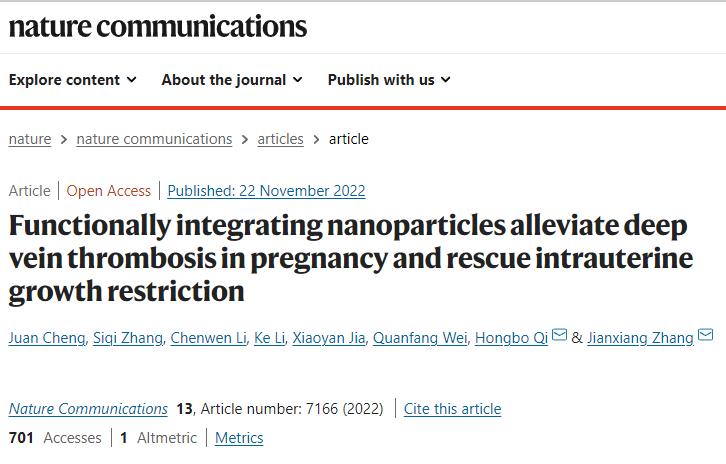Recently, the team of Professor Qi Hongbo of the Women and Children’s Hospital of CQMU, who is also the director of the Laboratory of Maternal and Fetal Medicine of the First Affiliated Hospital of CQMU, together with the team of Professor Zhang Jianxiang of the Army Medical University, published a paper titled “Functionally integrating nanoparticles alleviate deep vein thrombosis in pregnancy and rescue intrauterine growth restriction” in Nature Communications, an internationally renowned academic journal. In this study, a multifunctional nanodrug was constructed by self-assembly, which achieved the purpose of treating thrombosis during pregnancy by actively targeting the thrombus site, reducing local reactive oxygen species, and improving the inflammatory microenvironment. Moreover, the nanomedicine cannot cross the placental barrier, thus ensuring the safety of the mother and fetus. This study is the world's first to explore the prevention and treatment effect of nanomedicines on deep vein thrombosis (DVT) and fetal growth restriction (FGR) during pregnancy, which will help the research on clinical prevention and treatment strategies of related major diseases during pregnancy.

Research Assistant Professor Cheng Juan of the Laboratory of Maternal and Fetal Medicine of the First Affiliated Hospital of CQMU, and Zhang Siqi, a PhD candidate in obstetrics, are the co-first authors of the paper. Professor Zhang Jianxiang of the Army Military Medical University and Professor Qi Hongbo of the Women and Children’s Hospital of CQMU, who is also the director of the Laboratory of Maternal and Fetal Medicine of the First Affiliated Hospital of CQMU, are the co-corresponding authors. The research was specially supported by the National Key Research and Development Programme “Reproductive and Women’s and Children’s Health Protection”.